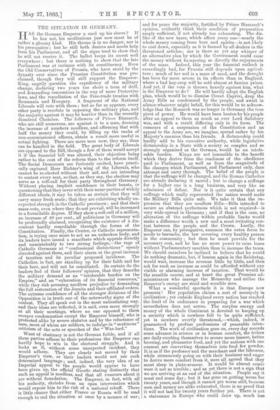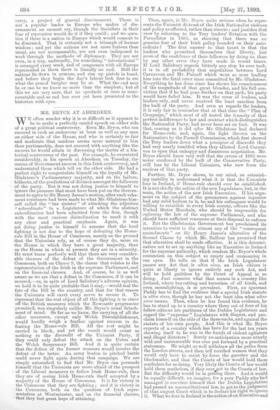THE SITUATION IN GERMANY.
HAS the German Emperor a card up his sleeve ? If he has not, his meditations just now must be of rather a gloomy kind. His throne is in no danger, nor is his prerogative ; but he still both desires and needs help from his Parliament, and all the signs tend to show that he will not receive it. The ballot keeps its secret well everywhere ; but there is nothing to show that the late Parliament was at variance with its constituency. Even the Old Conservatives of Prussia, who have stood by the dynasty ever since the Prussian Constitution was pro- claimed, though they will still support the Emperor - Ring, angrily question the expediency of the military change, declaring two years too short a term of drill, and demanding concessions in the way of more Protective laws, and the repudiation of the Free-trade treaties with Roumania and Hungary. A fragment of the National Liberals will vote with them ; but so far as appears, every other party is resolute in opposing the military plan, and. the majority against it may be heavier than in the recently dissolved Chamber. The followers of Prince Bismarck, who are still numerous, are against it to a man, deeming the increase of numbers needless, and affirming that with half the money they could, by filling up the ranks of non-commissioned officers, obtain a result more useful in actual fighting. There are more men now, they say, than can be handled in the field. The great body of Liberals are opposed to the Bill, though a few of them would accept it if the financial bill was altered, their objection being rather to the cost of the reform than to the reform itself. The Social Democrats are furiously excited, have practi- cally captured Herr Richter's wing of the Liberals, who cannot be re-elected without their aid, and are intending to contest every seat, so that, as they say, the election may serve as a roll-call for their party throughout Germany. Without placing implicit confidence in their boasts, or questioning that they cover with their name parties of widely different ideals, it may be taken as certain that they will carry many fresh seats ; that they are exhibiting wholly un- expected strength in the Catholic provinces ; and that their mass-vote, even where they do not prevail, will be increased to a formidable degree. If they show a roll-call of a million, an increase of 40 per cent., all politicians in Germany will be profoundly alarmed, recognising the existence of a dis- content hardly remediable through the forms of the Constitution. Finally, the Centre, or Catholic representa- tion, is trying once more to act as an unbroken body, and its leaders have issued a manifesto which appeals directly and unmistakably to two strong feelings,—the rage of Catholic Germans at "confessional distinctions" openly directed against them, and their alarm at the great increase of taxation and its peculiar proposed incidence. The Catholics, in fact, are standing up for their faith and for their beer, and will not be conciliated. So certain do the leaders feel of their followers' opinion, that they describe the military demand as an " intolerable burden on the Empire," and an "exhaustion of its financial resources," while they risk arousing needless prejudice by demanding the full restoration of the Jesuits and their affiliated orders. The extreme confidence of all the stronger divisions of the Opposition is in truth one of the noteworthy signs of the contest. They all speak out in the most unhesitating way, and their ideas are reflected, it is said, even more strongly at all their meetings, where no one opposed to them escapes condemnation except the Emperor himself, who is Protected alike by severe statutes and by the reluctance of men, most of whom are soldiers, to indulge in "mutinous" criticism of the acts or speeches of the "War-lord." Want of. obstinacy is not the German foible, and if all these parties adhere to their professions the Emperor can hardly hope to win in the electoral struggle. And it looks as if, without some unexpected incident, they would adhere. They are clearly not moved by their Emperor s view, or their leaders would not use such determined language ; and, indeed, the very idea of an Imperial appeal to the people would appear to have been given up, the official Gazette stating distinctly that such an appeal is needless, and that all rumours about it are withou.t foundation. The Emperor, in fact, with all his audacity, shrinks from an open intervention which would expose him to the risk of a national rebuff. There is little chance that either France or Russia will be mad enough to end the situation at once by a menace of war; and for peace the majority, fortified by Prince Bismarck's opinion, evidently think their condition of preparation amply sufficient, if not already too exhausting. The dis- like of the new taxes, which affect every one—nearly the whole money coming from beer and spirits—is not likely to cool down, especially as it is fanned by all dealers in the threatened articles ; nor is there as yet any whisper of an alternative plan by which the Government could raise the money without hampering so directly the enjoyments of the mass. Indeed, this year the financial outlook is exceedingly bad, for Prussia still depends upon agricul- ture; much of her soil is a mass of sand, and the drought has been far more severe in its effects than in England, where a bad hay-crop will be sold almost at famine prices. And yet, if the vote is thrown heavily against him, what is the Emperor to do P He will hardly adopt the English plan, which would be to dismiss Count Caprivi, drop the Army Bills as condemned by the people, and await in silence whatever might befall, for this would be to acknow- ledge that the Monarch was no longer in Germany the true pivot of power. He would. have been beaten by his people after an appeal to them as much as ever Lord Salisbury was, and with a result differing only in its form. The rumours of a suspension of the Constitution and an appeal to the Army are, we imagine, spread rather by his Majesty's enemies than his friends. A. dictatorship could hardly add to his executive authority, while legislative dictatorship in a State with a society so complex and so strongly organised as the German, would be an intole- rable burden. Kings are not insensible to the benefit which they derive from the readiness of the obedience paid to Parliament, as well as from the magnitude of the changes which Parliament, and Parliament only, dare attempt and carry through. The belief of the people is that the suffrage will be changed, and the Roman Catholics are already declaring it sacred ; but to change a suffrage for a higher one is a long business, and very like an admission of defeat. Nor is it quite certain that any suffrage which really represented the nation would make the Military Bills quite safe. We take it that the im- pression that they are needless Bills—Bills intended to secure an abstract perfectness which is not required—is very wide-spread in Germany ; and if that is the case, no alteration of the suffrage within probable limits would make a difference worth a new and a most irritating con- test between the people and the Crown. Lastly, the Emperor can, by prerogative, summon the extra force he needs to barracks, the law covering every healthy person in the community ; but then he must provide for the necessary cost, and he has no more power to raise loans without Parliamentary sanction than to increase the taxes. We should ourselves be inclined to believe that he would do nothing dramatic, but, if beaten again in the Reichstag, would wait, increase the revenue little by little, and then ask for such an increase as could be afforded without any visible or alarming increase of taxation. That would be the sensible course, and at heart the great Prussian ad- ministrators who manage the Monarchy and utilise the Emperor's energy are staid and. sensible men.
What a wonderful spectacle it is that Europe now presents ! Her population claims a sort of monopoly in civilisation ; yet outside England every nation has reached the limit of its endurance in preparing for a war which nevertheless does not arrive. The surplus energy and money of the whole Continent is devoted to keepina up a security which is nowhere felt to be quite sufficient, yet is nowhere overtly threatened,—which, indeed, is guaranteed by profuse professions of peaceable inten- tions. The work of civilisation goes on, every day records some advance in science or in human comfort, the toilers are daily exerting themselves to secure more leisure, better housing, and pleasanter food, and yet the nations with one consent are converting themselves into food for powder. It is as if the professor and the merchant and the labourer, while strenuously going on with their business and eager to derive more comfort from it, were all agreed that they must sleep in plate-armour. It would be almost comic were it not so terrible ; and as yet there is not a sign that we are arriving at an end of the situation. People say it must end some day ; but it has gone on getting worse for twenty years, and though it cannot get worse still, because men and money are alike exhausted, there is no proof that it will not last for twenty years further yet. There is not a statesman in Europe who could draw up, much lees carry, a project of general disarmament. There is not a popular leader in Europe who makes of dis- armament an earnest cry, though the Socialists in their fear of repression would do it if they could ; and we ques- tion if there is a nation in Europe which would consent to be disarmed. That is certainly not a triumph of human wisdom ; and yet the nations are not more furious than usual, are not unreasonable, are not even indisposed to work through the methods of diplomacy. They are not even, in a way, unfriendly, for something " international " is arranged every week, and of congresses with all Europe represented in them there is literally no end. Still the nations lie down in armour, and rise up pistols in hand, and before they begin the day's labour look first to see what the armed burglar may be at. What the end may be or can be we know no more than the simplest ; but of this we are very sure, that no spectacle at once so unac- countable and so sad has ever yet been presented to the historian with eyes.



































 Previous page
Previous page